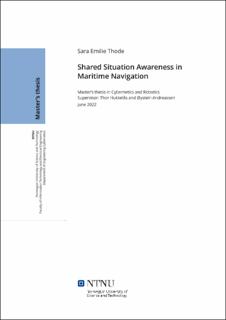| dc.contributor.advisor | Hukkelås, Thor | |
| dc.contributor.advisor | Andreassen, Øystein | |
| dc.contributor.author | Thode, Sara Emilie | |
| dc.date.accessioned | 2022-10-11T17:19:47Z | |
| dc.date.available | 2022-10-11T17:19:47Z | |
| dc.date.issued | 2022 | |
| dc.identifier | no.ntnu:inspera:102231297:63976706 | |
| dc.identifier.uri | https://hdl.handle.net/11250/3025442 | |
| dc.description.abstract | Hensikten med oppgaven er å identifisere elementene i Shared Situation Awareness (Shared SA) for å undersøke endringen i Shared SA når autonome skip og fjernoperasjonssentraler (ROC) inkluderes i det maritime miljøet.
Shared SA er essensielt i navigasjon og må støttes i det fremtidige maritime miljøet. Shared SA støttes hovedsakelig gjennom verbal og visuell informasjonsdeling. Nye dilemmaer oppstår imidlertid når autonome skip introduseres. Autonome skip kan ikke håndtere verbal kommunikasjon, og det må skapes tillit til autonome skip.
For å adressere problemet med å opprettholde Shared SA, ble det dannet et teoretisk grunnlag om Situation Awareness. Basert på det teorien og litteratur som beskriver ulike aspekter ved det maritime miljøet, ble det laget informasjonsmatriser som inneholder informasjonen som maritime deltakerne trenger fro å opprettholde Shared SA, og teknologien som brukes for å dele informasjonen ble identifisert.
Resultatene viser at Shared SA vil bli enda mer viktig ved introduksjon av autonome skip. Det kreves ny informasjon, og dermed øker informasjonsbehovet. Kombinasjonen av eksisterende og ny teknologi dekker det meste av informasjonen som trengs i det fremtidige maritime miljøet for å danne Shared SA. Imidlertid eksisterer det fortsatt et behov for fremtidig teknologi som kan lukke det potensielle teknologigapet.
Fremtidig forskning bør sette søkelys på informasjonen og ny teknologi som trengs for å støtte alle de maritime deltakernes Shared SA. Videre bør lover og regler vedrørende autonome skip og fjernoperasjonssentraler etableres. | |
| dc.description.abstract | The thesis aims to identify the elements of Shared Situation Awareness (Shared SA) for the final purpose of examining the change in Shared SA when autonomous ships and Remote Operation Centers (ROC) enter the maritime environment.
Shared SA is essential in navigation and must be supported in the future maritime environment. The Shared SA is mainly supported through verbal and visual information sharing. However, new problems arise when autonomous ships are introduced. Autonomous ships cannot handle verbal communication, and seafarers must trust the autonomous ships.
To address the issue of maintaining Shared SA, a theoretical foundation revolving around situation awareness is created. Based on the theoretical foundation and literature describing different aspects of the maritime environment, information matrices containing the information needed by maritime participants to obtain Shared SA are created, and the technology used to share the information is identified.
The results show that Shared SA will become even more critical when introducing autonomous ships. New information is required, and the information needs increase. The combination of existing and new technology covers most of the information needed in the future maritime environment to acquire Shared SA. However, there still exists a need for future technology which can close the potential technology gap.
Future research should focus on the information and new technology needed to support all the maritime participants’ Shared SA. Furthermore, rules and regulations regarding autonomous ships and remote operation centers should be established. | |
| dc.language | eng | |
| dc.publisher | NTNU | |
| dc.title | Shared Situation Awareness in Maritime Navigation | |
| dc.type | Master thesis | |
